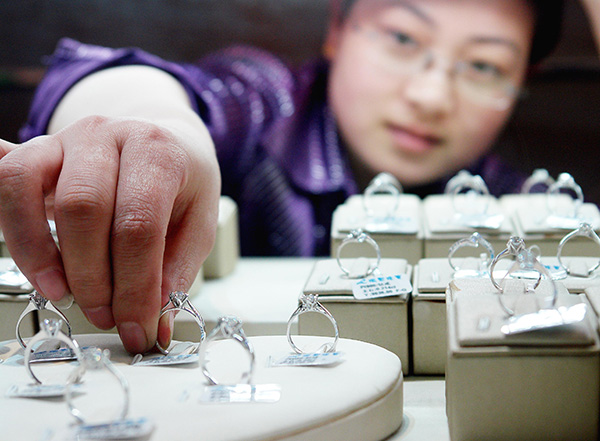Diamonds start to lose their luster to Chinese
(Agencies) Updated: 2015-11-02 07:28
 |
|
A sales woman picks up a diamond ring at a department store in Zhengzhou, Henan province. Chinese demand for diamond jewelry has dipped as compared with last year. [Photo provided to China Daily] |
That is bad news for Anglo American Plc.
Cooling demand for diamond jewelry in the country, the biggest market after the United States, is the latest sign that the nation's slowdown is not only a problem for industrial commodities.
At the same time, customers of Anglo American's De Beers division, which trades, cuts and polishes the stones, say the producer is demanding more for the gems than many in the industry say they can afford to pay.
"It is a catastrophe," Guy Harari, co-founder of rough-diamond trading platform Bluedax, said. "De Beers is saying it's business as usual; it's not business as usual. The market is much weaker than what De Beers tries to show the world."
Lower-than-expected demand from China has caused a blockage in the notoriously long diamond pipeline as inventories build and prices slide. Producers have also been reluctant to cede their hard-won price gains.
Anglo American, which owns 85 percent of De Beers, is counting on diamond profits to counter slumping earnings from its other divisions such as platinum, copper and coal.
De Beers accounted for more than one third of the company's first-half underlying earnings and was the biggest contributor to its profit. Anglo shares have since taken a hit.
What started as a slowdown in construction and industrial production is now hitting Chinese consumers, with luxury products especially vulnerable amid a clampdown on corruption.
Chow Tai Fook Jewellery Group Ltd, the world's largest listed jewelry chain, reported a 13 percent drop in second-quarter sales of gem sets last month as a government-led austerity campaign that prompted shoppers to cut back on luxury purchases gathered pace.
"It's not a 'China is over' story, it's just China is normalizing," Kieron Hodgson, an analyst at Panmure Gordon & Co in London, said. "The problem is the level of inventories that are in country or with the major retailers. It's backing up along the pipe."
The top two producers have taken action to shore up demand. De Beers has cut production twice this year by a total of 15 percent, and lowered prices at its sales, known as sights.
Still, that is not proving to be enough. Customers rejected 35 percent to 50 percent of diamonds on offer at De Beers' October sight, according to people familiar with the sale, who asked not to be identified as the information is not public.
- LeTV to release its first electric vehicle in April
- Brokerages see surging profits in first nine months
- Home prices continue to rise in Oct
- Lock-up shares worth 31.5b yuan to become tradable
- China investment company executive under police probe
- Weak demand pummels steel companies' finances
- Volkswagen confident despite emissions scandal
- Mercedes-Benz's GLC SUV nears China launch















